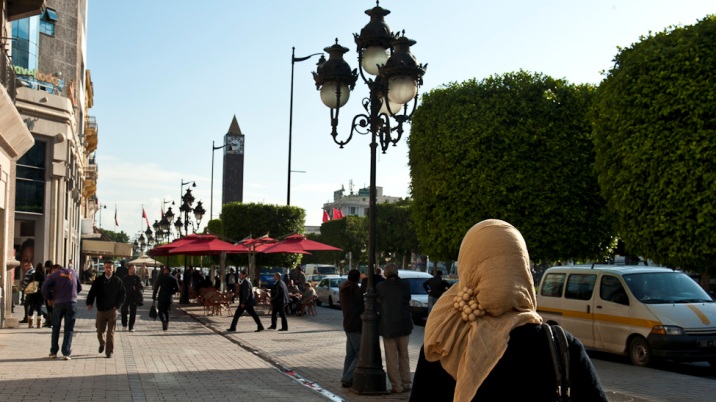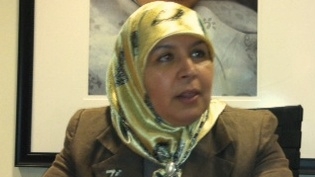What is being done to ensure that all Tunisians continue to have a voice in the transition process, beyond the elections?
Meherzia Laabidi, Vice-President of the National Constituent Assembly: First of all, they continue to have voice through their representatives within the Assembly. As a result of the electoral law, we have widespread representation, including all Tunisian political parties, and many independents belonging to none of the parties. We have also established strong links with civil society. We have appointed an assistant to the president of the Assembly who is in charge of the relations with civil society organizations and with Tunisians living abroad. We have about one million Tunisians living abroad, and we want them now to have a political role and political rights. We have also decided to make all the works of the Assembly open to media. So all media, audio-visual and written media, can attend these meetings and, of course report on them. We have quite an active and concerned civil society. There is a citizen initiative of a parallel Constituent Assembly, and we have many women organizations, development organizations, and many other groups of citizens who gather to watch the Assembly at work. I have to say that they are very alert and active. Whenever there is, let’s say, what might be perceived as an interruption to the democratic transition, they denounce it, they write about it, and many also demonstrate. You know that on a daily basis we have demonstrations in front of our Assembly. Sometimes, we are inclined to judge them and say that all the demonstrations are too much. But I think it’s better to have too many demonstrators, and too many causes and issues, than a passive civil society. We are also trying in our respective regions, as Deputies of this Constituent Assembly, to work on participatory democracy. We tell our constituents: “You know, democracy is not only voting – you need to follow up your vote by questioning your representatives, by monitoring them and always reminding them that the assembly is not only to draft the constitution, but also to guide the work of the government."
What role does the new access to information law and the openness agenda play in this process?
ML: Now there are no more taboos. I think it was a very positive decision to release all public information relating to numbers on employment, growth, public salaries, even of ministers, and the amounts allocated to development. There is no more, like in the past, only one source of numbers. We now have many sources of public information and Tunisians can compare and determine the truth, or determine the real numbers, and the real data on specific activities of the government. This is part of our democratic transition, to learn how to deal with the public information now available to citizens. There are some negative aspects, especially as we are not always dealing with classic media such as newspapers, TV and radio, where you have the right of response, and false information can be corrected. There are one million Tunisians now on Facebook. You can imagine how quickly information spreads in this group. We feel helpless sometimes because rumors spread so quickly. For example, I learned two days ago, when I arrived in Paris, that I am paid 14,000 Euros (US$18,400.00) per month. Imagine, 14,000 Euros in Tunisian dinars – it’s about 30,000 dinars. This is impossible! How can a member of parliament, even the president, be paid this high a salary? Maybe the President of the Republic, and I think even the President’s salary is not that high. This spread all over Facebook, and my husband answered, ‘believe me, I am still paying for her plane ticket!’ And she lives next to her sister, not in a very nice house…it seems I live in an expensive villa. So rumors and false information are spread on Facebook – this is the negative aspect. Yet, I think that guaranteeing the freedom and the independence of the media is an irrevocable choice. It’s better to bear this excess, let’s say, of freedom, than to limit the freedom of the media. I do believe that this freedom will regulate itself.
What is being done to address one of the other major causes of the revolution, economic exclusion? How can the playing field be leveled and give all Tunisians equal access to economic opportunities?
ML:This playing field has many, many uneven parts. There are even, let’s say, holes in it. So, how do we level it in the short term? More than 70 percent of the complementary budget project has been allocated to leveling the playing field, and to level and balance development between regions. Of course, it’s not enough. We need to grow, and increase our revenues. We also need increased sources of financing. We really need help, we need grants. Over the next one, two, three years we need grants to deliver on immediate expectations. This would also give us time, enough time, for investors to come and for their projects to be productive. There are immediate demands and we need the support to answer them. We also need good, clear and precise information about government projects. What can be implemented in three months, in one year, and what will have to wait. Our people need clear information about potential economic growth and what the targets are over the few next years. We also need to appeal to the sense of solidarity among Tunisians. We witnessed it during the revolution, and it is really wonderful. Families were supporting each other throughout this difficult period. We did the same with Libya. When the Libyan refugees came to Tunisia there was no humanitarian crisis. I do not mean to suggest that humanitarian organizations did not play a critical, they most certainly did, but the system of social solidarity also worked very well. Families invited families to live with them. More than that, they invited their children to join their children in the Tunisian schools. What I want now is to formalize this spirit of solidarity, so that Tunisians continue to help each other the way they helped the Libyans.
What are the key development challenges for Tunisia right now and where would international support be most effective in meeting those challenges?
ML:The key challenges are, of course, unemployment. We have an educated population which is both an advantage and a disadvantage. A considerable number of the unemployed also have university degrees. If you have a degree in a technical or financial field but for years have not practiced your profession –there is no immediate way of putting you in a productive position. Skills need updating, professionals need rehabilitation. We need a budget for that and time. For a long time, we also offered foreign investors a very low-wage labor force with almost no rights. Now, our people, who have led this revolution for dignity, cannot accept this anymore. We want to offer the investors a qualified labor force but we also want to secure rights for this labor force – and human dignity. So we have to be careful how we meet the challenge of unemployment. The previous regime also sold to the international community a big lie: that Tunisia has succeeded in eradicating poverty. And even Tunisians believed it! Ever since June 14th, we have been discovering the real poverty in Tunisia. The latest figures reveal that between 20 and 25 percent are living in poverty. This is a big challenge, because we have to take immediate and urgent measures to answer the expectations of these families on employment and housing. Tunisia also used to be considered a health success story, especially for maternal health. Over the last ten years health indicators have been deteriorating, including maternal healthcare. This is especially true in rural areas and poor urban areas. This is really dangerous because if maternal health deteriorates, then children are also affected. This challenge is also related to infrastructure. How can we develop and implement projects to develop in forgotten regions if they have no infrastructure. In some areas we have very nice archaeological sites. They could be tourist destinations, but there are no hotels, and there are no roads. There is a significant lack of facilities. I was told by a citizen from Kasserine in inner Tunisia, that in cases of emergencies, the nearest hospital is 150kms away. Where on earth are cities where a hospital is more than 12kms away? And here we are talking of 150kms! Infrastructure is a real challenge, but we cannot rely on the government alone. We have to appeal to civil society, to development organizations, and again to the solidarity of the people and the support of other friendly countries. The needs are really tremendous, and the resources are very limited.
Some analysts have claimed that the rights women enjoyed under the previous regime are actually under threat in the post-revolutionary environment. Is this correct?
ML:Our rights are not a grant from anyone. Our rights are our due rights, and there is a maturity to Tunisian women now that gives us the right to be political actors, social actors and economic actors. We don’t need any regime, or any political man to guarantee our rights. We need only to be citizens and to speak loudly of our rights, and Tunisian women are doing just that. Women are very active, proactive, and sometimes even aggressive in saying, ‘these are our rights and we will not give them up.’ So, the best guarantee is the level of awareness, social awareness and political awareness of Tunisian women. This level of awareness is now a fact for Tunisian women. Sometimes we have debates, and we have women who express fears about losing their rights. I think this is a healthy sign. When we fear for something, it means it is valuable, and it means we are aware of its value. But, I have to say, beware of alarmist speech, and the discourse that focuses only on fear. It has been used to make us fear our Islamic identity, and to suppress democracy, and to keep people under pressure, under, let’s say dictatorship. We have to fear for our rights, we have to guarantee to act together as Tunisian women to preserve them, but we cannot base our politics on fear.



